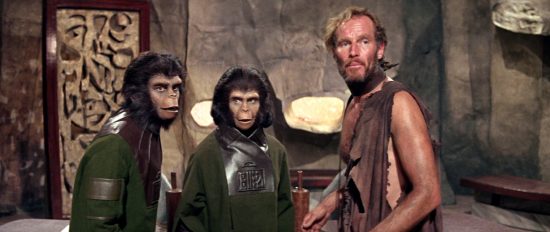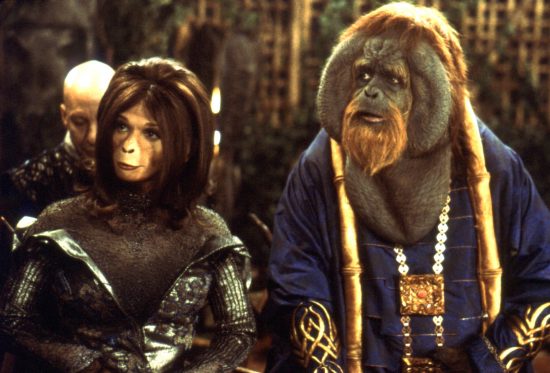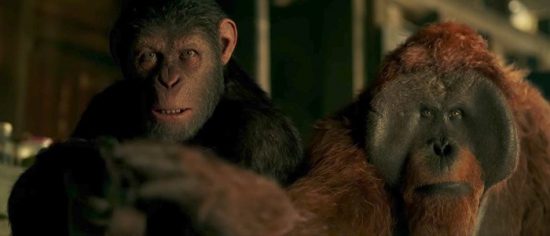Why Planet of the Apes continues to fascinate us
Next year marks the fiftieth anniversary of the Planet of the Apes film and TV franchise, and as the recently released War for the Planet of Apes shows, the series continues to garner critical acclaim and commercial success. As it approaches its half-century, let’s examine why this tale of humans dominated by a race of super-intelligent apes enthrals and fascinates us so much.
Although the Apes story can be traced back to French author Pierre Boulle’s 1963 novel La Planète des Singes, it was only when the tale was adapted 5 years later into the first Planet of the Apes film, that the franchise burst onto the popular consciousness. In the 1968 classic, Charlton Heston starred as 20th century astronaut George Taylor, who lands on a distant planet where mute, savage humans dressed in rags are hunted and enslaved by a civilization of advanced apes, who have developed language, wear clothes and ride horses. The film largely follows the plot of the original novel, with Taylor and his colleagues getting captured and studied by their new simian overlords. But this first film in the saga added a shocking reveal which cemented its place in cinema history.
With the help of friendly ape scientists Cornelius and Zira, Taylor escapes from captivity on horseback with a mute human bride. They travel up the coast until they discover a shattered Statue of Liberty, and Taylor, together with the audience, realizes that this distant planet is actually the earth of the future, destroyed by the humans who built it. This final scene has consistently been rated among the best twist endings in movie history, which sticks in peoples’ heads as much as the finales of 7even and The Sixth Sense. Personally speaking, I can watch Charlton Heston’s extreme overacting again and again on an endless loop. “Damn you, damn you all to hell!”
In many ways the 1968 adaption is a product of the late sixties zeitgeist, with its changing cultural landscape, the constant threat of nuclear annihilation, the Vietnam protests and the burgeoning civil rights and environmental movements. The hitherto unusual theme of the film, where white humanoids fall from a position of dominance, and then experience racism and slavery at the hands of an advanced ape culture, resonated with audiences worldwide, who were waking up to the impact of humanity on the world.
Today, the first Planet of the Apes movie is used as a reference point for the late 60’s in several other films and TV shows. For example, AMC’s Mad Men charted the sixties using the plot device of a Madison Avenue advertising agency, and in the penultimate season it shows us the year is 1968 by having Don Draper watch the famous reveal at the movie theatre with his infant son. In a rather lighter tone, Austin Powers goes back in time to swinging London and informs Felicity Shagwell that, “in the future entire meals come in pill form, and the Earth is run by damn dirty apes!”
The success of this first film inevitably spawned several movie sequels, which followed Taylor’s adventures on an ape-dominated Earth, and ended with a 1974 television show, which was canned after one season of poor ratings. While these offerings received mixed reviews, the plot of the last three movies in the franchise (Escape, Conquest and Battle), would later form the basis of the 21st century reboot.
This reboot was first attempted back in 2001, when Tim Burton was hired to remake 1968’s Planet with a plot which was a little more loyal to Boulle’s original novel. Burton’s film hasn’t aged well, and feels tonally much less dark than the original franchise, although this may have something to do with casting Marky Mark in the Heston role. However, it did touch rather more on how animals are being exploited by us humans, even when we mean well, and the ending is actually quite fun in a head-scratchingly confusing way. Unlike poor Charlton Heston, Wahlberg’s hero character does manage to return to the present day, crash landing on the Lincoln Monument, only to find that it is now dedicated to Ape General Thade, who in this alternate universe freed the apes who now control America.
After Burton stated that he would rather jump out of a window than direct another Apes film, the rights holders Fox sat on the franchise for a decade. However, money talks, and the successful reboots of Bond and Batman in the mid-noughties, persuaded Fox to follow suit with a similar Origins-style film. 2011’s Rise of the Planet of the Apes introduced the concept of apes rising above humans to a new generation, this time delving deeper into how our civilization fell and how the apes advanced so fast.
To be fair, epidemic flicks like Contagionand Twelve Monkeys have done the fall-of-humanity-because-airplanes angle better than Rise of the Planet of the Apes ever could. What really sets Rise apart is Andy Serkis’s moving performance as the original intelligent ape Caesar, and by the end, we are rooting for him and his tribe of loveable primates against the humans who have mistreated them. When Caesar gives Koba permission to throw Jacobs off the Golden Gate Bridge, it’s hard not to feel that revenge is a dish best served in the cold water of the San Francisco Bay.
The two follow-ups to Rise, (Dawn and War) continue the theme of ape emancipation, and in a neat tie-up, we found out in the recent War for the Planet of the Apes that the son of Caesar gets named as Cornelius, who (it is assumed) will later help Charlton Heston’s character escape and find the destroyed Statue of Liberty in the 1968 film.
Whereas the earlier films of the 60’s and 70’s dealt with fears of humanity destroying itself, the recent reboot has focused more on how we treat animals, particularly our closest cousins. Back in 1968 we were placing ourselves in Charlton Heston’s shoes (or rather, bare feet), asking how we could be so stupid. In 2017, we are placing ourselves in Caesar’s boots and asking ourselves how we could be so cruel.
Our identification with the apes is best illustrated by the kind of Planet of the Apes merchandise which sells the best. Caesar’s brooding face is everywhere, even replacing Che Guevara on absolutely hilarious Viva La Evolution t-shirts. The official Planet of the Apes slot game is heavily biased towards Caesar and friends, and if you are lucky enough to spin a row of apes, then you are onto a sure-fire winner. It seems that even in real life, the apes are now in control of us.
Where the franchise goes from here isn’t clear. Although Fox is unlikely to pass up the guaranteed money machine that a fourth rebooted film would bring, it’s hard to see what missing plotlines they could still explore.
However, there is now a time gap between Cornelius the child and Cornelius the scientist. Perhaps we could see the apes rediscover the mute, surviving rump of humanity, and learn why they decide to enslave them and treat them with the cruelty they showed in the very first film. We have already grown to love these apes, and admire them as being more moral, more humane than us. It would be pretty cool to see them degenerate into the cruel and exploitative society that captured and enslaved Charlton Heston and his colleagues.
“Get your stinking paws off me, you damned dirty ape!”













